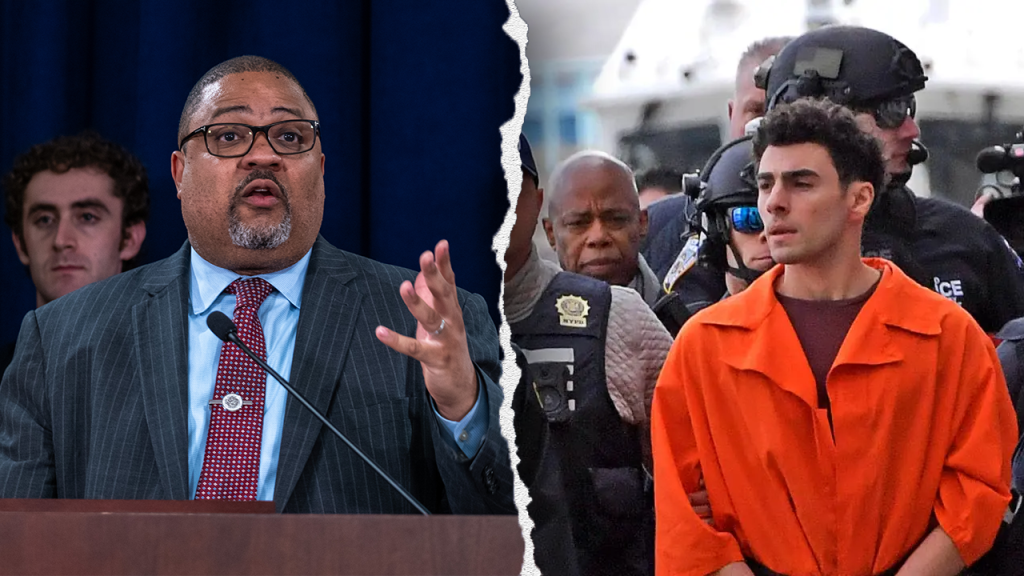The case of Luigi Mangione, the Ivy League computer expert accused of assassinating UnitedHealthcare CEO Brian Thompson, has sparked controversy over the nature of the charges brought forth by Manhattan District Attorney Alvin Bragg. The first-degree murder charge, which includes an element of terrorism, has raised eyebrows among legal experts who question whether this charge accurately reflects the crime. While premeditated murder typically falls under second-degree murder in New York, first-degree charges are reserved for specific circumstances like the killing of a police officer or a murder involving torture. The prosecution’s assertion that the killing of Thompson constitutes an act of terror has been met with skepticism, with some analysts suggesting it could be a strategic overreach, potentially undermining the prosecution’s case in the long run.
The defense team has also challenged the terrorism component of the charges, highlighting the seemingly contradictory nature of the state and federal cases. While the state accuses Mangione of terrorism with the intent to influence a group of people, the federal charges focus on stalking, murder, and firearms offenses, without mentioning terrorism. This discrepancy has fueled speculation that Mangione is being treated differently due to his victim’s high-profile status. Furthermore, the federal charges introduce the possibility of the death penalty, a punishment unavailable in New York, raising additional concerns about the proportionality of the potential sentence.
Legal experts have drawn parallels between the Mangione case and other recent prosecutions handled by Bragg’s office, citing instances where charges were perceived as overly aggressive or potentially politically motivated. The case of Daniel Penny, the Marine veteran who was acquitted in the death of Jordan Neely, is often cited as an example of overcharging. Similarly, the prosecution of Donald Trump, then a presidential candidate, has been criticized by some as politically driven. These precedents have fueled skepticism surrounding the terrorism charge against Mangione, with some suggesting it reflects a pattern of prosecutorial overreach by Bragg’s office.
The potential motivations behind the terrorism charge remain a subject of debate. Some analysts believe it stems from the victim’s prominent role in corporate America, suggesting that the prosecution may be seeking to make an example of Mangione. Others argue that the terrorism angle weakens the case, potentially jeopardizing a conviction on a lesser charge of second-degree murder. The defense’s argument that the killing was motivated by personal grievance rather than an intent to incite terror adds another layer of complexity to the case. The conflicting narratives presented by the prosecution and defense will ultimately be decided by a jury, adding to the uncertainty surrounding the outcome.
The public spectacle surrounding Mangione’s extradition from Pennsylvania, which some have likened to a scene from a superhero movie, has also drawn criticism. The high-profile nature of the arrest and subsequent perp walk, in contrast to the handling of other murder cases in New York City, has fueled perceptions of unequal treatment. Critics argue that the theatrics surrounding Mangione’s arrest reflect an attempt to sensationalize the case and potentially prejudice public opinion against the defendant. This perceived showboating by law enforcement further complicates the already controversial case and raises questions about the fairness of the proceedings.
As the case progresses, the competing narratives presented by the prosecution and defense will be subject to intense scrutiny. The question of whether Mangione’s actions constitute terrorism, or if personal grievance fueled the killing, will be central to the trial. The varying interpretations of the law and the potential disparities in treatment based on the victim’s status will undoubtedly shape the course of the legal proceedings. Ultimately, the jury will determine the outcome, weighing the evidence and legal arguments to arrive at a verdict that could have significant implications for future cases involving similar circumstances.


